Covid: School return chance for more pupils before Easter
- Published
- comments
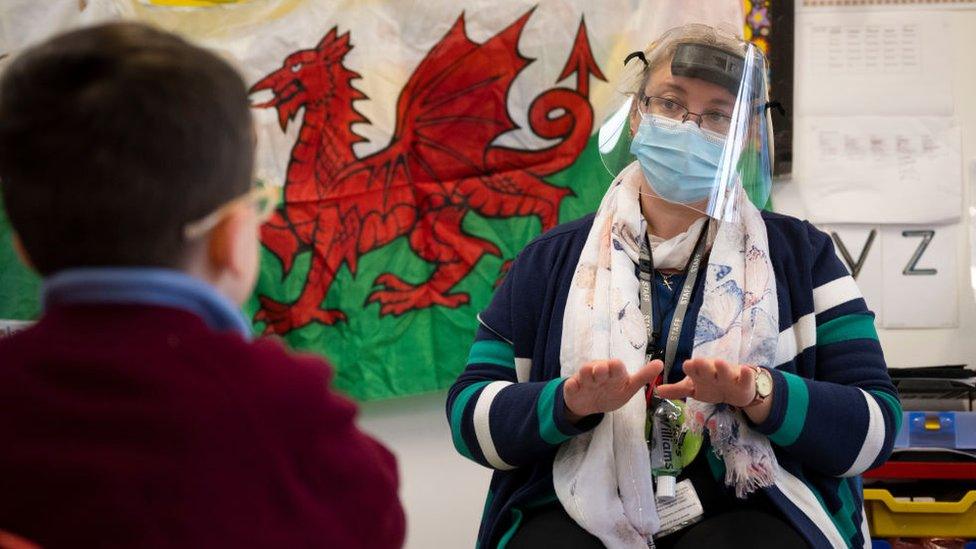
Pupils and teachers now have to wear face coverings in class if social distancing cannot take place
More pupils in Wales could be back in class before Easter, but there will not be a full return to school, the education minister has said.
Schools will be able to welcome pupils in years 7, 8 and 9 for "check-in" sessions before they are due back fully from mid-April.
Kirsty Williams said falling Covid case rates meant pupils could return "earlier".
But teaching unions warned the return must not lead to schools closing again.
Ms Williams said while there was "no evidence to suggest widespread transmission in schools and colleges", for the first time official advice means pupils and teachers will have to wear face coverings in class, if they cannot stay two metres apart.
Wales' youngest pupils began returning to the classroom on 22 February for the first time since before Christmas, when schools closed to almost all pupils due to the coronavirus pandemic.
Ministers originally hoped all primary pupils, years 11 and 13, and some college students would return from 15 March, with flexibility for year 10 and 12, to return.
The Welsh Government then faced backlash after hinting non-essential shops could be reopened at an earlier date.
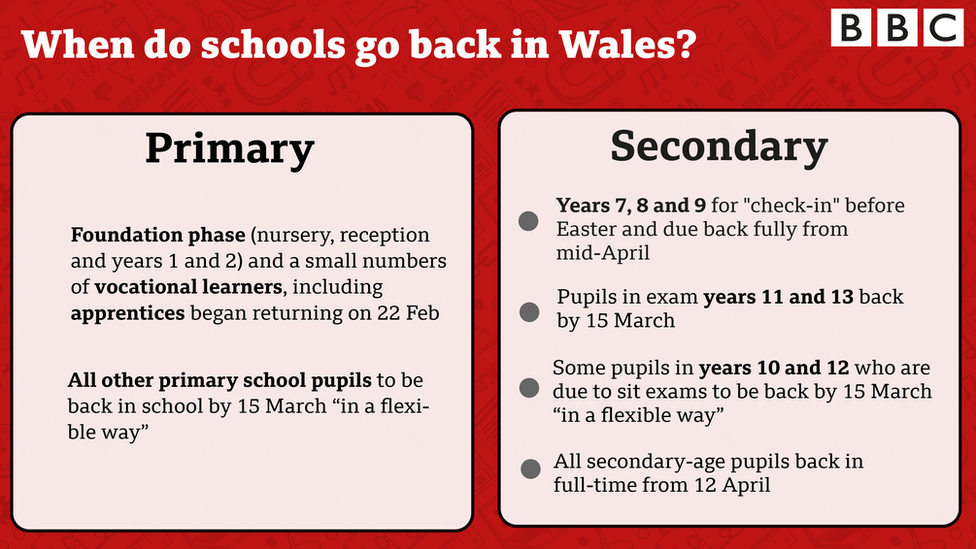

Now schools will be allowed to decide whether to give 11 to 14-year-olds the "opportunity" to see teachers face-to-face before the Easter holidays begin, in a similar way to the check-in before last year's summer holidays.
However this will depend on the scientific advice at the next review of Covid rules on 12 March.
Ms Williams, said the changes for pupils in years 7, 8 and 9 had been made possible by the latest scientific advice, which showed case rates heading "in the right direction".
But, she added, caution was still needed and Wales was not in a position to have a "big bang approach" to schools' return.
"We've been very clear that should the scientists give us the all clear to have more children back in school then we would grab that opportunity," she said.
"Thankfully, because of the massive efforts of the Welsh public, we are continuing to see case rates fall here in Wales, [Covid] positivity levels fall and pressure being taken off our NHS."
Parents will not be fined if they choose not to send their children to school, unless there are welfare concerns, new guidance states.
Welcoming the decision, the Welsh Conservative's Senedd leader Andrew RT Davies called the decision a "u-turn", while Plaid Cymru's Sian Gwenllian said support for virtual learning must continue.
Allow X content?
This article contains content provided by X. We ask for your permission before anything is loaded, as they may be using cookies and other technologies. You may want to read X’s cookie policy, external and privacy policy, external before accepting. To view this content choose ‘accept and continue’.

The Scottish government also changed its plans on Tuesday, to allow all secondary pupils to return to school part-time before Easter.
All pupils in England are due to return to school from 8 March, which is also when a phased return begins in Northern Ireland.
Gareth Evans, director of education policy at University of Wales Trinity St David, said the announcement helped provide clarity for parents, who might have been wondering why it was not safe to return in Wales.
'Unnecessary distraction'
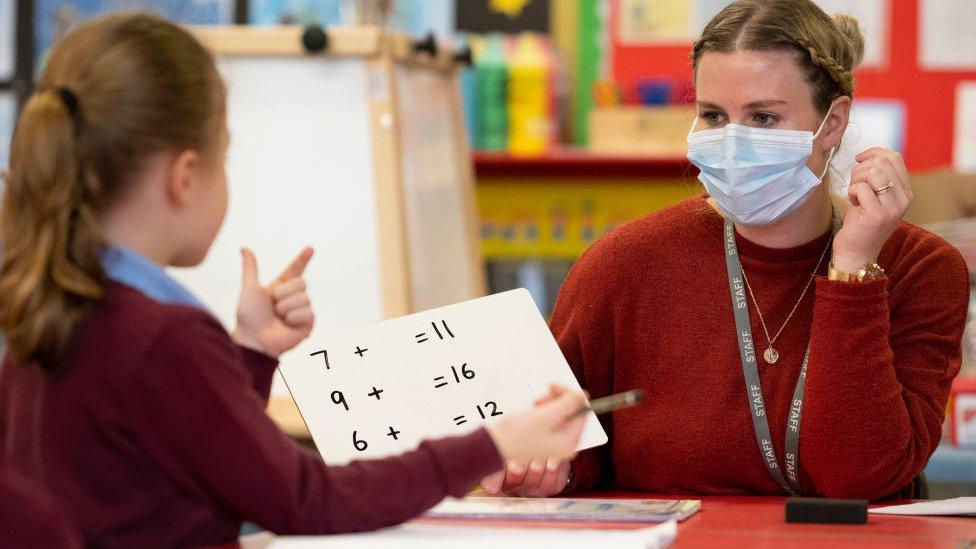
Youngest pupils have already returned to the classroom
Meanwhile, Hugh Davies, president of the Association of School and College Leaders in Wales, said there was concern the announcement would create an expectation from parents that their children would return before Easter.
Mr Davies, who is also head teacher at Olchfa Comprehensive School in Swansea, said: "On one level flexibility is a good thing, one size doesn't fit all... but sometimes flexibility can also set up confusion in the minds of parents".
He added: "My fear is that just as we are beginning to focus our minds on coming out of the pandemic... suddenly parents will be conflicted and comparing one school with another... that's probably an unnecessary distraction at this point."
'Schools must not close again'
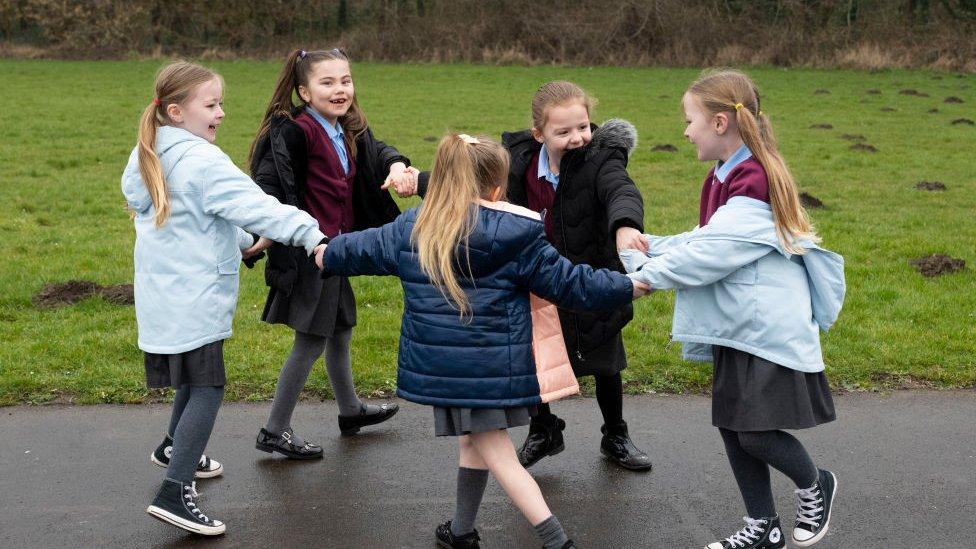
Unions have raised concerns for children's wellbeing if schools close again
One teaching union said they were "surprised by the proposed acceleration before the hard data exists to support it".
"We have not had a full return of foundation phase across Wales yet and what we don't want is to see schools having to close again because we have brought in too many learners too quickly," said NAHT Cymru director Laura Doel.
A change in guidance means secondary school pupils and teachers will now be told to wear face coverings in classrooms if social distancing cannot be maintained.
Until now they had only been required outside the classroom, such as in school corridors and canteens. Other safety measures include teachers being encouraged to open windows, and older pupils being offered asymptomatic testing.
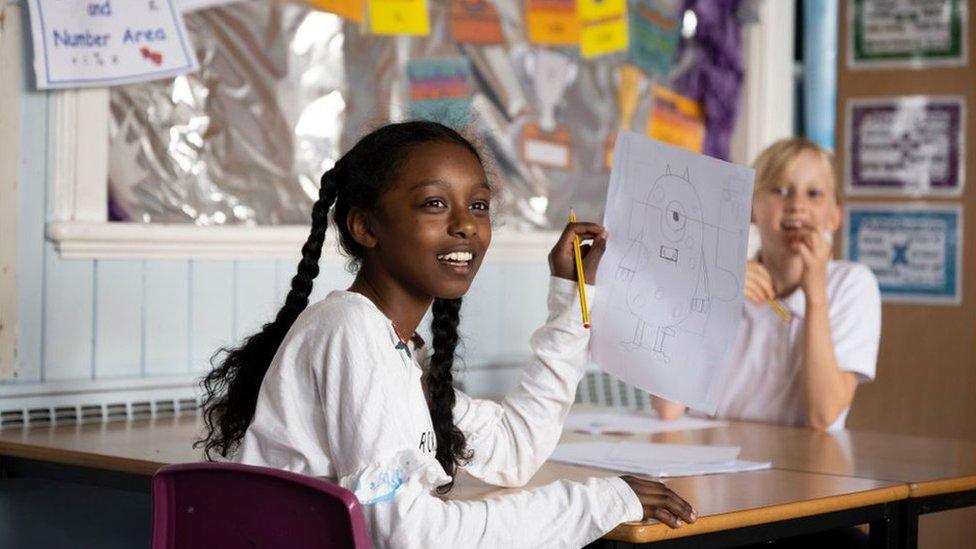
What do teachers and parents think?
The education minister had been criticised by some parents last week who said they were "furious" hairdressers, non-essential shops and tourism would reopen before their children could return to the classroom after Easter.
No firm dates have been set for relaxing lockdown measures in Wales, but a provisional roadmap suggests non-essential shops could reopen on 15 March.
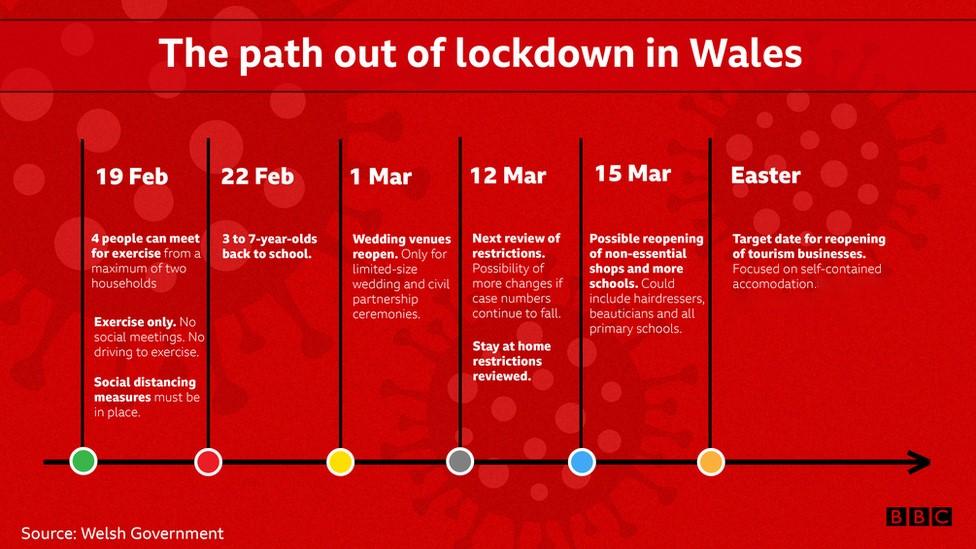

Faced with parents who said their children's futures were "being ruined", Ms Williams said scientists had advised pupils should go back gradually to stop a risk of case rates jumping significantly.
Ms Williams announced the proposed changes on Monday, saying the falling case rates meant schools could return "further and faster" than originally planned.
Jackie Parker, head teacher at Crickhowell High School, said the change meant children could have a day or two to see their friends and teachers before the holiday.
But she added: "I think it is going to be a period of juggling. It may be different for different schools."
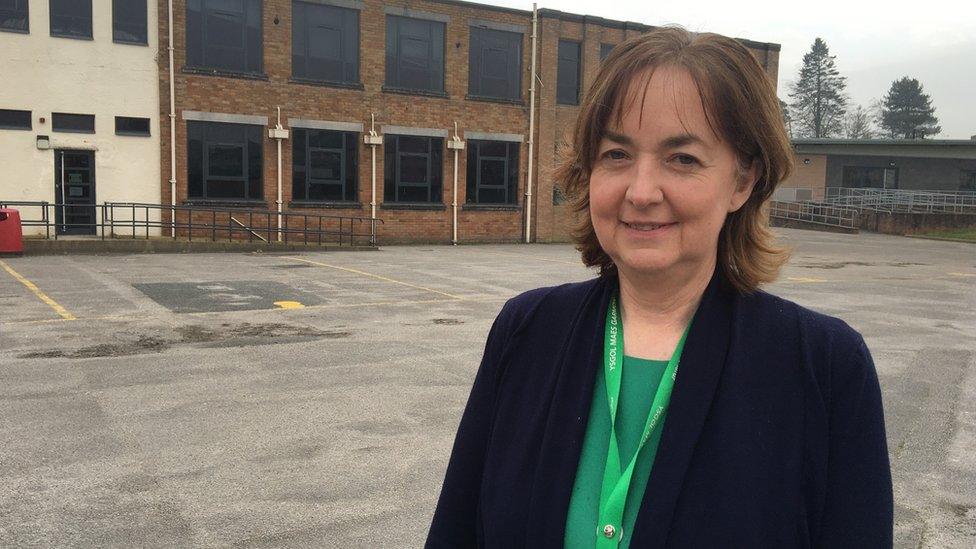
Bronwen Hughes, headteacher of Ysgol Maes Garmon, said preparations were under way to welcome pupils back
Bronwen Hughes, head teacher at Ysgol Maes Garmon in Mold, Flintshire, said it was important that teachers had the chance to "check in and catch up" with pupils to prepare them for their return.
"Practically, a part-time return means that we have to plan effectively," she said, adding parents needed to know exactly when pupils would be in.
"As long as we plan it well, assess our risks and prepare, the sessions years 7, 8 and 9 spend in school will be beneficial for them."
Emma Safhill from St Asaph, Denbighshire, whose daughter is in Year 9, said having some in class time was "better than nothing".
"She confessed the other day she'd be pleased to go back, have some normality and see her friends," Ms Safhill added.

BITESIZE CYMRU WALES: Educational programmes in English and Welsh
LOCKDOWN LEARNING: How can BBC Bitesize help you learn from home?

Related topics
- Published4 July 2022
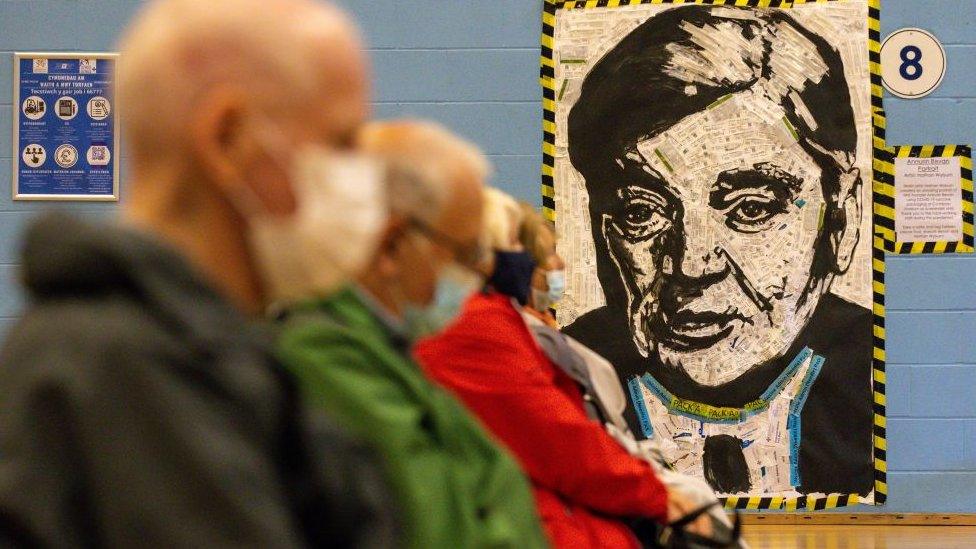
- Published27 February 2021
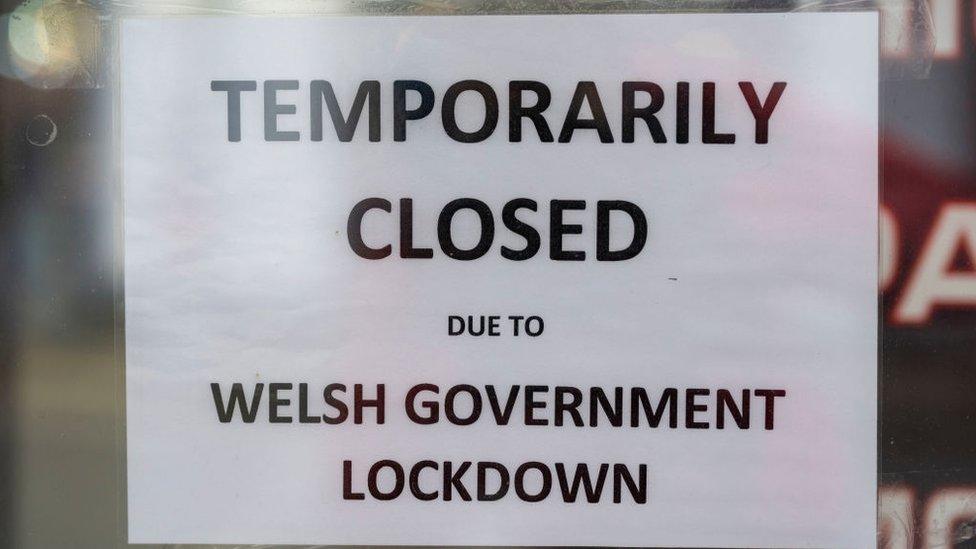
- Published27 May 2022
